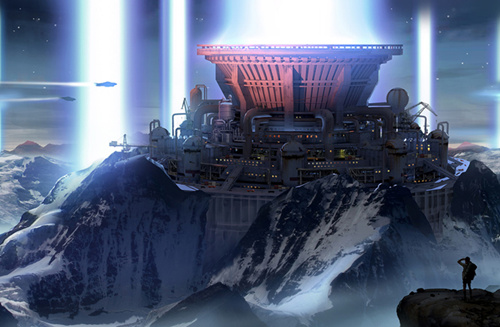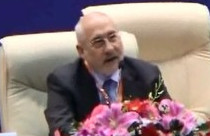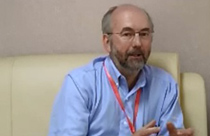
. > RESEARCH > LITERATURE
Sci-fi novels: Scientific spirit with humanistic touch
Author : ZHAN LING Source : Chinese Social Sciences Today 2019-03-07

China’s homegrown sci-fi blockbuster The Wandering Earth scored at the holiday box office. It tells of how humans construct thousands of engines to drive the earth to navigate the universe and avoid destruction. Photo: FILE
Since the beginning of the 21st century, with the return of realism to the mainstream of the literary world, a number of full-length works have shown epic ambitions, some of which have been science fiction. Though the total volume of the genre is not large, it can provide new texts for the study of the epic narrative.
Scientific reasoning
As a genre that takes the universe as the scope of its setting and the origin and end of all beings as its timeframe, science fiction has a natural epic quality. Just look at the title My Conquest Is the Sea of Stars, the first animated adaptation of Tanaka Yoshiki’s Legend of Galactic Heroes series. The name itself spells out succinctly and vividly the vast spatial and temporal dimensions of science fiction. This scope enables science fiction to imagine the rise and fall of the entire human race across the boundaries of individuals, families and nations.
Compared with realistic novels, science fiction, with the aid of modern science and technology, has the possibility of re-describing the past and projecting the future, which allows it to more magnificently depict a long historical picture.
In addition, whether real historical events are re-perceived in a reversible state or reality is given a fictional future, sci-fi models are apt at forming a dynamic causal relationship between virtuality and reality, which enables science fiction to reveal the essence of history in a more profound way.
As Darko Suvin put it in his Positions and Presuppositions in Science Fiction, “Fictional reality or possible world, the sum of all the cultural topoi and categories implied and presupposed by a text constitutes the ideological system of its social addressee.”
While science fiction sets its eyes on the eternity of the universe, it is always in line with the spirit of the times. It is this “sci-fi novel as epic narration,” as Darko Suvin calls it, that makes grand narratives commonplace in full-length science fiction, such as Isaac Asimov’s The Galactic Empire Trilogy, Vernor Vinge’s A Fire Upon the Deep and Dan Simmons’s Hyperion Cantos.
For a long time, Chinese science fiction has been a creation in the service of reality. From the early 1950s to the 1980s, the theme of Chinese science fiction was limited to solving problems in daily life and production. Therefore, some predictable small inventions were imagined. Even though some space fantasies were created, they were merely vehicles to popularize scientific knowledge.
After that, some writers strived to keep science fiction creation in line with the literary trends at that time, so though the literary value of the genre made certain improvements, it had yet to effectively establish its own literary style, which led to some novels achieving an extension of time and space but still lacking in-depth observations of the nature of history.
The 1990s were an exciting time for sci-fi fans. Beyond depicting real-world issues and futuristic problems, Chinese sci-fi authors also finally extended their reach to the cosmos.
In works such as The Return of Adam, Inseminating on Mercury, Expecting for a Century and Escape From Mother Universe, Wang Jinkang opens up new worlds, allowing us to travel back in time to primitive society or hibernate through interstellar space to arrive in a distant future. He made it possible to reflect on the impacts of genetics, artificial intelligence and space technology through an examination of the height of the entire human civilization.
Liu Cixin’s monumental Rememberence of Earth’s Past, written in the grand style, is a galaxy-spanning, idea-rich narrative of war and invasion. It begins during the Cultural Revolution and ends 18,906,416 years into the future. There is a scene in ancient Byzantium and a scene told from the perspective of an ant. The first book is set on Earth, though several of its scenes take place in virtual reality representations of the Qin Dynasty and ancient Egypt. By the end of the third book, the stage has expanded to encompass an intercivilizational war that spans not only the three-dimensional universe but other dimensions too.
In addition to its vast scope of space and time, the unique scientific spirit and aesthetics of science fiction also endow this genre with epic potential. Wang once said that the grand and profound scientific system itself is the aesthetic of science fiction.
However, the disciplinary barriers caused by the division of the arts and sciences make it difficult for the beauty of science to be expressed in words, which requires novelists to have both literary and scientific knowledge. In other words, the grand scale of a sci-fi story needs to be supported by an immense quantity of research.
In Liu’s “Cannon of Earth,” a cannon fires into space through the center of the Earth, and in The Wandering Earth, the Earth’s engine is taller than Mount Everest, illustrating the machine aesthetics spurred by modern science and technology while at the same time embodying a sense of power and wonder, different from the majestic beauty of natural mountains and rivers. It is a kind of beauty that combines rationality, order and logic with the cold, solemn and noble.
Humanistic care
As technologies evolve, they not only change our society but also transform our customs, even our reproductive strategies and ethics. In other words, science alters humanity.
The difference between sci-fi and other literary genres is its affinity with science. Science fiction writers, more often than not, encrypt their values and beliefs into their depiction of science and technology in civilization. Wang explores the validity of human cloning in Quasi-Human. While raising concerns for the moral and ethical issues of genetics and artificial intelligence, Wang maintains an optimistic and firm belief.
Similarly, though Liu’s view of the universe as a dark forest may be pessimistic, his view of humanity and its future is extremely optimistic.
In the contemporary era, under the influence of utilitarianism, traditional interpersonal relationships and forms of trust are being severely challenged, and society and the natural world are becoming increasingly alienated.
In this light, the reconstruction of scientific and technological belief by science fiction authors is an attempt to find new spiritual support for the modern anxieties of the Chinese people. So today’s literature must be built on the solid foundation of a people-oriented spirit and on the exploration of human nature.
Only when the scientific spirit is combined with humanistic care can science fiction truly be epic.
Literary value
That said, the literary value of science fiction must be emphasized. No matter how grand the scale of the scene or how high the spirit, if the narrative cannot keep up, the readability is still problematic.
At present, many Chinese science fiction works set a grand stage, traveling easily to interstellar destinations and thousands of years into the future. Pretty much everything is epic—huge ideas, huge scope, huge story—but these works lack compelling characters, emotions and plots as well as storylines that take the reader’s breath way.
As an example of a work that does it right, each character in Three-Body Problem has a unique personality. The character Zhang Beihai in particular embodies the spirit of heroism and dedication, leaving a deep impression on readers.
Some writers misunderstand the function of science fiction, or their scientific literacy and writing skill is imbalanced. Along with the critics’ inadequacies, all these problems beat down on the development of Chinese science fiction. Since the publication of China’s first original science fiction novel in 1904, speculative fiction has undergone a hundred years of dramatic ups and downs.
Now, with the sensation of Liu’s Three-Body Problem and The Wandering Earth, the golden years of Chinese science fiction have arrived. Therefore, it is urgent for every science fiction writer and researcher to make good use of this opportunity and improve the quality of science fiction.
Zhan Ling is from the School of Humanities at Hangzhou Normal University.
(Edited by YANG XUE)
Interview with Wang Gungwu on significance of studying overseas Chinese
Wang Gungwu is a distinguished Australian historian who studies overseas Chinese. He currently works at the Faculty o...
-
On the rat/mouse of the zodiac
2020-02-20
-
Regional development calls for Huaihe culture’s soft power
2020-01-10
-
Archaeological discoveries unveil Maritime Silk Road
2020-01-06
-
China’s industrial art printing
2019-12-10
-
Yue-Gan Ancient Road: A journey into Hakka history
2019-05-13
-
The Lantern Festival in Dream of the Red Chamber
2019-02-18













 2011-2013 by www.cssn.cn. All Rights Reserved
2011-2013 by www.cssn.cn. All Rights Reserved